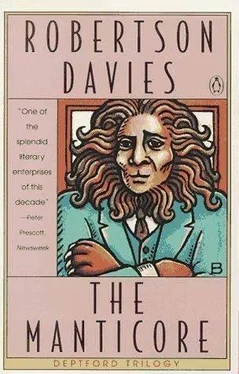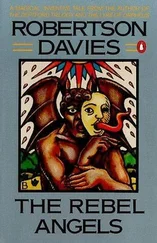
Robertson Davies
The Manticore
The second book in the Deptford series, 1972
"When did you decide you should come to Zurich, Mr. Staunton?"
"When I heard myself shouting in the theatre."
"You decided at that moment?"
"I think so. Of course I put myself through the usual examination afterward to be quite sure. But I could say that the decision was made as soon as I heard my own voice shouting."
"The usual examination? Could you tell me a little more about that, please."
"Certainly. I mean the sort of examination one always makes to determine the nature of anyone's conduct, his degree of responsibility, and all that. It was perfectly clear. I was no longer in command of my actions. Something had to be done, and I must do it before others had to do it on my behalf."
"Please tell me again about this incident when you shouted. With a little more detail, please."
"It was the day before yesterday, that is to say November ninth, at about ten forty five p.m. in the Royal Alexandra Theatre in Toronto, which is my home. I was sitting in a bad seat in the top gallery. That in itself was unusual. The performance was something rather grandiosely called The Soiree of Illusions – a magic show, given by a conjuror called Magnus Eisengrim. He is well known, I understand, to people who like that kind of thing. He had an act which he called The Brazen Head of Friar Bacon . A large head that looked like brass, but was made of some almost transparent material, seemed to float in the middle of the stage; you couldn't see how it was done – wires of some sort, I suppose. The Head gave what purported to be advice to people in the audience. That was what infuriated me. It was imprudent, silly stuff hinting at scandal – adulteries, little bits of gossip, silly, spicy rubbish – and I felt irritation growing in me that people should be concerned about such trash. It was an unwarranted invasion of privacy, you understand, by this conjuror fellow whose confident assumption of superiority – just a charlatan, you know, seeming to patronize serious people! I knew I was fidgeting in my seat, but it wasn't until I heard my own voice that I realized I was standing up, shouting at the stage."
"And you shouted -?"
"Well, what would you expect me to shout? I shouted, as loud as I could – and that's very loud, because I have some experience of shouting – I shouted, 'Who killed Boy Staunton?' And then all hell broke loose!"
"There was a furore in the theatre?"
"Yes. A man standing in a box gave a cry and fell down. A lot of people were murmuring and some stood up to see who had shouted. But they quieted down immediately when the Brazen Head began to speak."
"What did it say?"
"There are several opinions. The broadcast news reported that the Head suggested he had been killed by a gang. All I heard was something about 'the woman he knew – the woman he did not know,' which, of course, could only mean my stepmother. But I was getting away as fast as I could. It is a very steep climb up to the doors in that balcony, and I was in a state of excitement and shame at what I had done, so I didn't really hear well. I wanted to get out before I was recognized."
"Because you are Boy Staunton?"
"No, no, no; Boy Staunton was my father."
"And was he killed?"
"Of course he was killed! Didn't you read about it? It wasn't just some local murder where a miser in a slum is killed for a few hundred dollars. My father was a very important man. It's no exaggeration to say it was international news."
"I see. I am very sorry not to have known. Now, shall we go over some of your story again?"
And we did. It was long, and often painful for me, but he was an intelligent examiner, and at times I was conscious of being an unsatisfactory witness, assuming he knew things I hadn't told him, or that he couldn't know. I was ashamed of saying 'of course' so often, as if I were offering direct evidence instead of stuff that was at best presumptive – something I would never tolerate in a witness myself. I was embarrassed to be such a fool in a situation that I had told myself and other people countless times I would never submit to – talking to a psychiatrist, ostensibly seeking help, but without any confidence that he could give it. I have never believed these people can do anything for an intelligent man he can't do for himself. I have known many people who leaned on psychiatrists, and every one of them was a leaner by nature, who would have leaned on a priest if he had lived in an age of faith, or leaned on a teacup-reader or an astrologer if he had not had enough money to afford the higher hokum. But here I was, and there was nothing to do now but go through with it.
It had its amusing side. I had not known what to expect, but I rather thought I would be put on a couch and asked about sex, which would have been a waste of time, as I have no sex to tell about. But here, in the office of the Director of the Jung Institute, 27 Gemeindestrasse, Zurich, there was no couch – nothing but a desk and two chairs and a lamp or two and some pictures of a generally Oriental appearance. And Dr. Tschudi. And Dr. Tschudi's big Alsatian, whose stare of polite, watchful curiosity was uncannily like the doctor's own.
"Your bodyguard?" I had said when I entered the room.
"Ha ha," laughed Dr. Tschudi in a manner I came to be well acquainted with in Switzerland; it is the manner which acknowledges politely that a joke has been made, without in any way encouraging further jokiness. But I received the impression – I am rather good at receiving impressions – that the doctor met some queer customers in that very Swiss little room, and the dog might be useful as more than a companion.
The atmosphere of the whole Jung Institute, so far as I saw it, puzzled me. It was one of those tall Zurich houses with a look that is neither domestic nor professional, but has a smack of both. I had had to ring the bell several times to be admitted through the door, the leaded glass of which made it impossible to see if anyone was coming; the secretary who let me in looked like a doctor herself, and had no eager public-relations grin; to reach Dr. Tschudi I had to climb a tall flight of stairs, which echoed and suggested my sister's old school. I was not prepared for any of this; I think I expected something that would combine the feeling of a clinic with the spookiness of a madhouse in a bad film. But this was – well, it was Swiss. Very Swiss, for though there was nothing of the cuckoo-clock, or the bank, or milk chocolate about it, it had a sort of domesticity shorn of coziness, a matter-of-factness within which one could not be quite sure of its facts, that put me at a disadvantage. And though when visiting a psychiatrist I had expected to lose something of my professional privilege of always being at an advantage, I could not be expected to like it when I encountered it.
I was an hour with the Director, and a few important things emerged. First, that he thought I might benefit by some exploratory sessions with an analyst. Second, that the analyst would not be himself, but someone he would recommend who was free to accept another patient at this time and to whom he would send a report; third, that before that I must undergo a thorough physical examination to make sure that analysis, rather than some physical treatment, was appropriate for me. Dr. Tschudi rose and shook me by the hand. I offered also to shake the paw of the alsatian, but it scorned my jocosity, and the Director's smile was wintry.
Читать дальше













